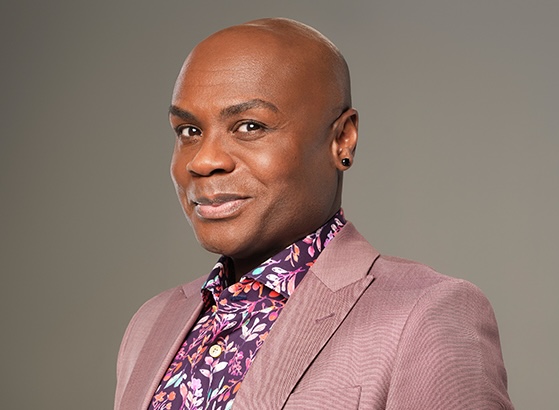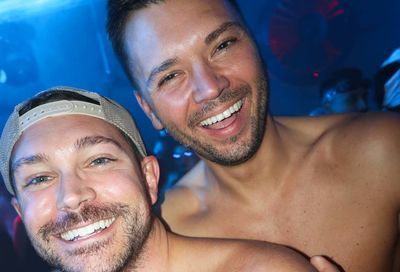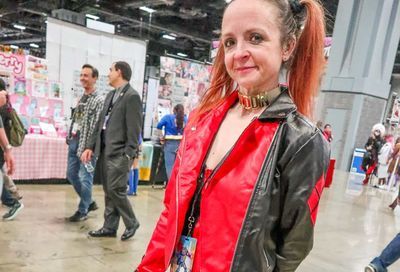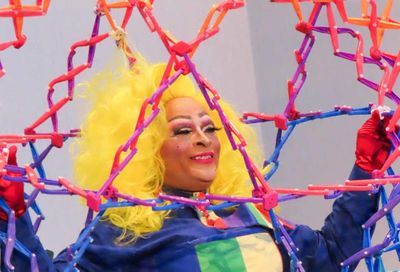In Depth Q&A: Love, Simon director Greg Berlanti
With his newest film, director Greg Berlanti has created a warm, winning, groundbreaking gay teen comedy.

Until recently, it seems, happy endings weren’t written into the Hollywood script for gay-themed films. Even following the big splash of mid-90s wide-release comedies like The Birdcage and In & Out, major studios ceded the queer cinema arena to indie producers, save for the rare awards-bait drama of LGBTQ folk dying for love (Brokeback Mountain), for the community (Milk), or for hope of better days ahead (Philadelphia, The Hours).
Then came Moonlight, not a studio-released film, but an arthouse favorite that became a media darling, a financial success, and an Oscar-winner for Best Picture. That unprecedented happy ending helped pave the way for another award-winning, gay-themed romance, last year’s Call Me By Your Name, a triumph by any measure that very likely could generate a sequel.
Audiences could be witnessing a queer cinema renaissance that continues apace with director Greg Berlanti’s Love, Simon, the first studio-released teen comedy to feature a gay protagonist. Starring Nick Robinson (Jurassic World) as closeted high schooler Simon Spier, it might be the swoon-worthy, big-picture, boy-meets-boy romance that gay-friendly film fans have craved ever since Molly Ringwald first met Duckie.
Based on the young adult novel Simon vs. the Homo Sapiens Agenda by Becky Albertalli, the film delivers 21st-century snark, with the heartfelt storytelling and characterization that were a hallmark of ’80s teen-movie mogul John Hughes. Yet, despite a strong sense of nostalgia, the sights and sounds at Simon’s Creekwood High feel fresh, from the diverse student body, to the movie’s eclectic pop-rock soundtrack, executive produced by Bleachers frontman Jack Antonoff.
Freshest of all is Robinson’s richly authentic performance as a teenager struggling to find the strength to come out. The 22-year-old actor credits his performance largely to the film’s openly gay director.
“My main touchpoint through this whole process was Greg,” says Robinson. “Greg was the one who brought the script to my attention, who convinced me to do the part, who championed this movie from start to finish. He was the one that I talked to the most about his experience and what it was like for him to come out and be a closeted teen in high school, what that was like, how he felt.”
Berlanti guided his lead actor through what is essentially a hero’s origin story. It’s an appropriate analogy given his role as executive producer of DC Comics’ thriving lineup of superhero TV series. Launched in 2012 by The CW with the action-drama Arrow, the so-called “Arrowverse” shows — including Supergirl, The Flash, and Legends of Tomorrow — comprise a sprawling inter-connected universe of super-powered heroes, villains, and masked vigilantes, all overseen by producer Berlanti. The Berlanti shows, with the addition of new hits Riverdale and Black Lightning, include a wealth of complex lesbian, gay, and bisexual characters.
The Rye, New York native, who made his feature directing debut with the 2000 gay dramedy The Broken Hearts Club, and who currently boasts seven network series on the air, indeed has a whole world in his hands.
But that world was rocked to its core in 2017 by sexual harassment allegations against one of the Arrowverse’s most powerful figures, showrunner Andrew Kreisberg. Ultimately, internal investigations by the network, and at Berlanti’s production company, led to Kreisberg’s dismissal. The series, along with their casts and crews, weathered the storm of pain and controversy, becoming another symbol of an industry willing to hold perpetrators accountable, and to stir up change that benefits everyone in the workplace.
As the dust settled in December, Berlanti took a major step for personal change, tying the knot with his longtime love, soccer player Robbie Rogers. Rogers had stirred up his own controversy in 2013 when he joined the MLS team L.A. Galaxy, becoming the first openly gay male participant in any of the major North American sports leagues.
Berlanti proudly acknowledges Rogers, with whom he’s raising a son, as the hero who inspires him daily — just as Love, Simon will, no doubt, inspire many on their own path to being their authentic selves.

METRO WEEKLY: Love, Simon fits within the tradition of great teen comedies, with the same kind of heart and wit as John Hughes movies. Beyond the source novel and the script, what else inspired you as director on the film?
GREG BERLANTI: We definitely looked at a lot of the John Hughes films, particularly for just the way he would frame the scenes, and the kind of lenses he would use. We certainly have a soundtrack and score reminiscent of that era. We made conscious choices to evoke that sort of slightly nostalgic feeling, while also hopefully being contemporary too in the storytelling. There were so many more movies when I was that age that made you laugh and cry, whether it was a James Brooks film, something like Terms of Endearment, or the witty, almost farcical comedies, like Tootsie.
I think so many times these days, studio films in particular, the comedies have to be comedies, and the dramas have to be dramas. They experiment more in the younger space, I think maybe because we make them for so much less. It still allows for a certain kind of creativity, and a blend of tones. I think there’s been a lot of successful teen comedies since that have had that kind of quality too, like Mean Girls.
Also, from a technical standpoint, I looked at a lot of movies in the ’80s that I grew up with, in part because I think the other thing that they did, in terms of their framing stylistically, was they made really small moments feel big. You had these kind of high school moments that still felt iconic and big, which is how you’re experiencing them when you’re that age.
MW: Speaking of Mean Girls, Nick Robinson does a good job as Simon getting off some really funny burns, but he doesn’t come off as bitchy or mean. What are some other qualities that you think Nick brought to the part?
BERLANTI: I think the number one quality that Nick has as a person and as an actor — and he brings it to the performance — is that you feel for him. He creates empathy. The most important thing for me on the emotional journey of the movie, was that the audience really identify with something throughout. It’s such a fine-tuned thing when you’re talking about what does it mean to come out today, in this age, in this moment. There is a lot more openness and understanding, but it still can be challenging, and we still can create our own closet in our heads. The fear, and the shame, and the empathy, but then also to do all that, but then still have a lightness about him.
Nick has an easy hand with comedy that makes it seem effortless. A lot of what he does in the movie seems effortless, but he puts a lot of time and craft into it. I have a deep respect for him that at his young age he’s so focused and dedicated, in terms of how he portrays a role, and the kind of energy he puts into that portrayal.
MW: What about casting Simon’s group of friends? Did you see basically every twentysomething in Hollywood?
BERLANTI: Yeah, I did. I think between the shows that I work on and this, I have a good knowledge of everyone pretty much between certain ages in Hollywood. We did chemistry tests. I had a lot of the specific kids come in and read with Nick. You can get two separate great actors, and if they don’t have chemistry, particularly where comedy is concerned, forget about it.
I also built in a week and a half of rehearsal time. I think young people, in particular, have to actually become close to appear close on screen. When you start doing rehearsal and they’re trying things and experimenting, then they hang out at night afterwards, they become the clique you see represented in the movie.
MW: Let’s talk about the parents. You had worked before with Josh Duhamel on Life As We Know It. What led you to Jennifer Garner?
BERLANTI: For both the parents, we wanted this sort of idealistic kind of family, that you feel like, “It seems so obvious. If you knew you had great parents, why is it so hard to come out?” That’s the point — even in a perfect situation, there still can be challenges that you feel internally, and that every family can seem ideal on the outside, but still have things happening inside, that they have to work through and work out. I think Jen and Josh both have a warmth that you knew you wanted to [be around]. I didn’t want the audience to veer away from the high school scenes and the antics of that, to feel, “Oh gosh, now I’ve got to go back and watch family scenes.” You kind of want them to compete and be equally interesting and dynamic.
I’ve always adored Jennifer Garner, in her portrayals and in her roles. If I could dream up a perfect mom, I would have dreamed up her. I think a lot of kids feel that way. She had that energy on set, certainly in getting to know her, she came to actually be that kind of individual. The speech she makes that sort of drives home the third act is not in the original version of the script she saw, and she signed on anyway and said, “Look, the one thing I’d love is to connect with him in this way.” That’s why we put real time and effort into making sure that the parents seemed distinct and different, so they both were, in a sense, an audience member on this kind of journey.

MW: Are there aspects of that relationship that reflected your own experiences as a teen?
BERLANTI: Yes. When we were drilling down on those scenes, I said to Isaac Aptaker and Elizabeth Berger, who wrote the script and did a phenomenal job, that for me there were two things I needed to hear after I came out — that I didn’t even realize I needed to hear, and that seemed so obvious. One was that I was still loved. The other was that I deserved love, which I think is different. I think that hearing, as an LGBT person, that you deserve love just as much as anyone else, is, in a way, what the movie’s about, and what Simon’s journey is about, as it draws towards the end of the movie.
MW: Staying on your teenage years, were you a comics reading kid?
BERLANTI: From when I was around 11, 12, till about 15, 16, were my high points, which was smack in the ’80s, when there was a lot of cool things happening in comic books. “Crisis of Infinite Earths” was happening in the DC space. “Secret Wars” was happening in the Marvel space. I think it’s really reflected in the movies we’re seeing now, because there was so much great, exciting storytelling happening back then.
MW: How do you respond to people who feel that superhero fiction is literally consuming pop culture?
BERLANTI: I think they certainly have a point. I love comics, too, and as somebody who’s participated in it, the audience is in as much control of it as the executives are, truthfully. It’s so much of what they watch, buy tickets for, get excited by. I think what you’re seeing now that’s really helpful, though, is that comic books are the larger genre, and there’s many genres within them. So you’re getting war pictures, and you’re getting mysteries, and you’re getting even R-rated comedies inside of the genre. Part of it is these characters, but they’re using these characters to still tell really, really exciting stories.
MW: What were your formative experiences around superhero fiction or this world of fantasy? How did you absorb it?
BERLANTI: Because I wanted to be a storyteller, I absorbed it like it informs how I wanted to tell stories. I loved the cross narratives. There were pieces of stories inside other books, and you had to connect them laterally. I loved that. I loved that they had events, but they still had heart, and that there were things that were larger than life.
I think as a gay person — I’ve said this before, but it’s really true — there wasn’t a lot of gay content when I was growing up, really anywhere. You had to make it up in your mind in some ways, especially if you were closeted, and there was no internet, and you were in a small town. Superheroes, in some ways to me, were these people who I identified with because they all have secrets and they all were trying to be part of the world, but also felt really different from the world that they were a part of.

MW: The Arrowverse shows actually are a great counter to that, because they also have many positive portrayals of LGBTQ characters — though I’m not sure if I’ve seen any trans characters. Is that visibility a matter of constant negotiation with the network and with your writers, or is it just full speed ahead, everybody’s on board?
BERLANTI: I would say everybody’s on board, but it’s always a conversation, especially if you’re taking a character that’s existed one way in the comic books, and you’re changing the race, gender, or sexuality of that character. It’s going to be a conversation with all the powers that be. We’ve just been pushing from day one. I think your point is accurate: we need more trans representation on the shows. I want that. I think one of the things I’m really proudest of is the kind of representation we have, but what I’m most excited by is the challenge of what’s before us, doing more of it.
MW: What is your method for keeping track of all of these series, and scripts, and projects?
BERLANTI: I have a great team of people around me, who work for me, many of whom have worked for me for many years. They help me figure out my day and my week, month. And then, all the individual different showrunners could do what they’re doing without us. They just choose to work with us, so we try to do what we can to make their experience a good one. Then I try and divide up my day. I try and do things with writing or story stuff in the mornings. Then throughout the day, I become more and more of a producer, and interface with people more by the middle of the day and to the end of the day. I kind of break it up almost between, I divide my hats between being a writer and being a producer, between the first half and the second half of the day. One’s a lot more insular and alone, and then the other is a lot more engaged and around people.
MW: Do you keep a mental whiteboard? Are you addicted to some kind of organizing app?
BERLANTI: I’m very analog about it. I still use a yellow pad and a pen. I wake up in the morning and I write down a list of things I have to get done that day. I’ll wake up probably about 5 a.m., and then I work just alone and privately between 5 and 8 a.m. Then I take some time to spend with my son, if he’s up, and get him ready in the morning. A lot of that time in the early, early morning is just about organizing my day in my head, and going through what I need to get done.
MW: You mention your son. When I mentioned to my husband that I would be interviewing you, he said, “Oh, he’s married to Robbie Rogers and they have a kid.” I was like, “How do you know that?” Even as a behind the camera player, you lead somewhat a high profile life. Does that make parenting hard? Are you happy to be a role model, as a gay couple and parents, and as a person, or is that just the price of success?
BERLANTI: I’m a pretty shy person. I avoid most red carpets and things like that, but I made a decision that I wasn’t going to not share my life because of what I do, that I was going to behave the same way I would behave if I didn’t do something that was connected to entertainment. I didn’t want to hold myself back in any way. If you have a kid, if you’re in love with somebody — I know what those images would have meant to me when I was younger, so probably it’s the soft spot that I have for that, that makes me open to sharing that kind of stuff.
MW: Robbie came out and was the first openly gay male athlete in one of the major North American sports leagues. As a partner, can you describe what considerations go into being out in that arena?
BERLANTI: I’m really proud of him. I think there’s a reason why he inspired a lot of people. He’s about 15 times as inspiring if you’re actually his family or his friend, if you’re close to him in any way. I’ve watched him go through a lot. I think whenever you’re a trailblazer, which I believe he really is, you’re [seeing that] experience on two levels. You have to experience all of the scrutiny of a player in a major professional sport, plus he had to experience the scrutiny of being gay doing that. It’s a whole other extra psychological burden that he just did it with grace and dignity. I couldn’t be more proud of him, really.

MW: There haven’t been other sports figures who have followed him out of the coset. What’s holding them back?
BERLANTI: I don’t know. Robbie would be able to give you a better answer. He’s said before publicly and privately, he thought after he came out that there was going to be a lot of people that followed, and I thought after we made Broken Hearts Club twenty years ago, that there were going to be a lot more movies like that to follow. I hope now, after we’ve made Love, Simon, there will be a lot more movies that follow. But I don’t control all that stuff, and nor does he. Hopefully everybody continues to speak their truth and do their part.
MW: On the subject of Broken Hearts Club, I was saddened by the recent death of John Mahoney. Further to that, I was annoyed that many media outlets seemed to go out of their way to not mention his life as a gay man, as well as the film. Did you catch that?
BERLANTI: Honestly, I was so saddened by his passing that I didn’t really have any other emotions about it. He was such a good person to me at that moment in my life. I had zero directing experience, and the studio said that they would make the film if he said yes. He said yes to someone with zero directing experience, with a negligible budget, to go do that film, because he connected with the material and believed in it — and believed in me. It validated a part of my life and me as a storyteller at a moment that really deeply affected the arc of my life. I didn’t think about much else, other than I just wished that he was still here, and I could never thank him enough for what he did for me.
MW: This morning my editor and I were talking about Little Shop of Horrors, because he happens to be interviewing Frank Oz today. He was talking about Oz’s films, and it turns out, you are attached to direct a remake of Little Shop. How is that coming along?
BERLANTI: First, I just want to say about Frank Oz, that when I was 13 years old, I wanted nothing more than to be a puppeteer. I used to build my own puppets. This is horribly embarrassing, but I would construct my own puppets. I brought them one day to the set, because I heard that they were in town shooting The Muppets Take Manhattan in my hometown. Frank Oz was so nice to me. He took out all my puppets and he started playing with them, and giving them voices. I’d just keep asking him to do Yoda. He got a little annoyed at that point I think, but he was so kind, and it was maybe the first director or person behind the scenes that I really met on a set.
As far as Little Shop goes, we’re in the middle of working on the draft. I’m really excited about it. I think of all the things that I’m working on right now, it’s at the top of the list. I saw a production of it when I was really young. I saw the first Off-Broadway production of it. I produced a version of it in college. It’s always meant a lot to me. I’ve always loved the story and the music, and the film. I think it’s ripe for retelling.
MW: How do you envision pulling off Audrey II?
BERLANTI: I think that’s a big reason for why you can do it again now. There’s a way to animate the plant that brings it new life, and that’s probably as much as I can say about it.
MW: The staff and crews of the Arrowverse shows lived through a really high profile sexual harassment case and investigation. What are some of the lessons learned from that?
BERLANTI: We’re doing a number of things now to make sure that there’s a lot of communication that’s happening between higher ups in different departments. The number one thing for me to learn was to remind everyone that you work with that it’s a safe environment, and that it’s safe for them to report if they think it’s not.
Everybody needs to feel like it’s a safe place to do their best work and to succeed. It’s the number one obligation you have as any kind of leader in any kind of environment. Obviously the more information, the more you can do something about things.
MW: What do you think needs to happen so that this moment of hyper vigilance and awareness doesn’t fade, and that this movement really sticks?
BERLANTI: What I love about [this movement] is that — and it’s not dissimilar to why I made the film — creating empathy and awareness for people just makes the world better. Everyone has their own obligations in small ways and big ways in their life, to do that. That’s part of everyone’s journey, whether it’s in the art you make or in the office you run. We live in an amazing time, because people’s eyes are being opened to things. But we also live in a scary time, because there’s a lot of dark forces at work that want to take things backwards. The only way we’ll all keep marching happily forward into a much better future is if we live honestly and openly, and encourage people when we can.
Love, Simon is rated PG-13, and opens everywhere on Friday, March 16. Visit fandango.com for tickets.
Support Metro Weekly’s Journalism
These are challenging times for news organizations. And yet it’s crucial we stay active and provide vital resources and information to both our local readers and the world. So won’t you please take a moment and consider supporting Metro Weekly with a membership? For as little as $5 a month, you can help ensure Metro Weekly magazine and MetroWeekly.com remain free, viable resources as we provide the best, most diverse, culturally-resonant LGBTQ coverage in both the D.C. region and around the world. Memberships come with exclusive perks and discounts, your own personal digital delivery of each week’s magazine (and an archive), access to our Member's Lounge when it launches this fall, and exclusive members-only items like Metro Weekly Membership Mugs and Tote Bags! Check out all our membership levels here and please join us today!



























You must be logged in to post a comment.